Home Renovation Costs in 2025
Home renovation can add up before you even start. Here is what you need to know about home renovation costs in 2025.
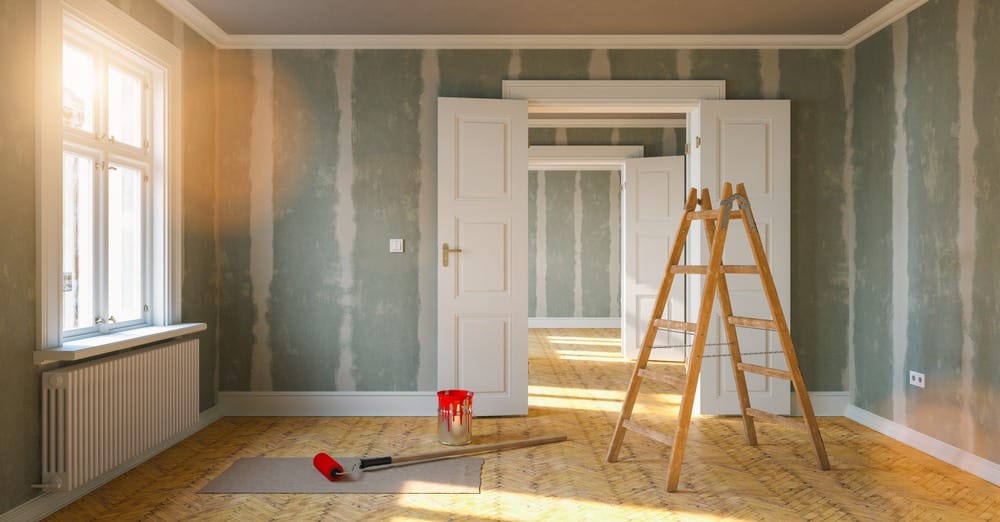
With the cost of real estate on the rise, many homeowners are choosing to renovate their existing homes rather than buying new ones. Renovating your home, be that a small project or a full-blown remodel, can add value to your home and make it more enjoyable to live in.
In this post, we break down the most common renovation costs you might encounter during your project. This will help you better understand what's involved in a renovation project and make a more informed decision.
Renovating vs buying new
In the long run, renovating an existing property is often cheaper than buying a new one. However, these figures can vary significantly depending on various factors, including the size of your home, the extent of the renovations, and your location.
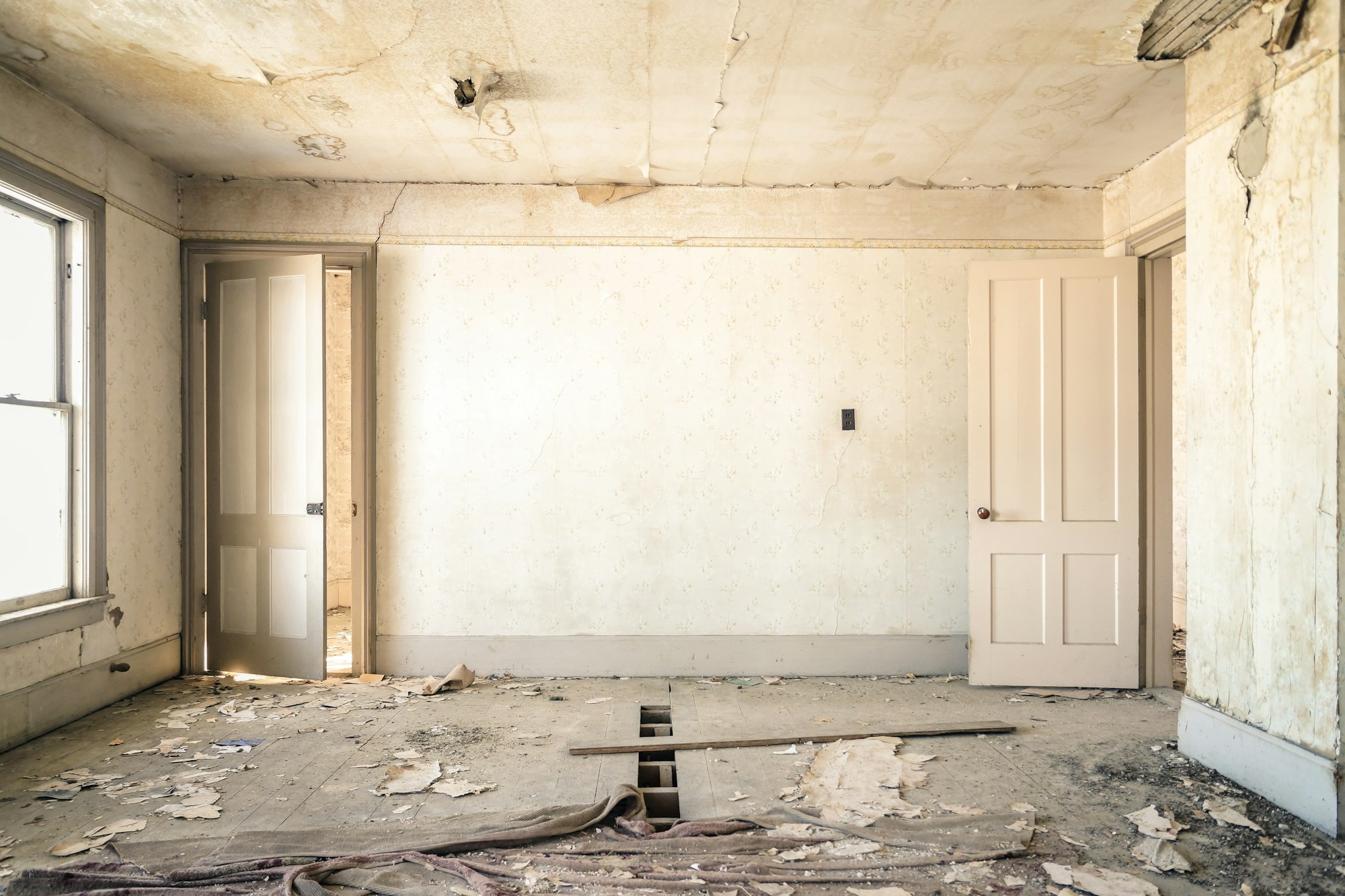
You can also use an online home renovation cost estimator to get an idea of how much your home's repairs will cost you.
With the average home renovation cost ranging between $20,000 on the low end and upwards of $100,000+ on the high end, it might be challenging to understand how to set a realistic renovation budget.
Median range: $20,000 to $100,000+
In general, the average whole home renovation cost in the United States ranges from $20,000 for smaller projects to $100,000 and more for a standard-size home. Yet, the range of costs is vast due to factors such as location, the extent of the renovations, and the type of materials used.
It's important to note that these are approximate figures, and the actual expenditure for your home renovation project may differ. To establish a more tailored estimate, consider the following factors.
Full home renovation cost factors
Renovating an entire home is a complex and costly endeavor. Here are the primary factors that can substantially impact your overall renovation budget.
Type of home
The type of home you have will set the stage for how complicated or extensive your home renovation and cost will be. Different styles and types of homes involve various structural complexities and sizes.
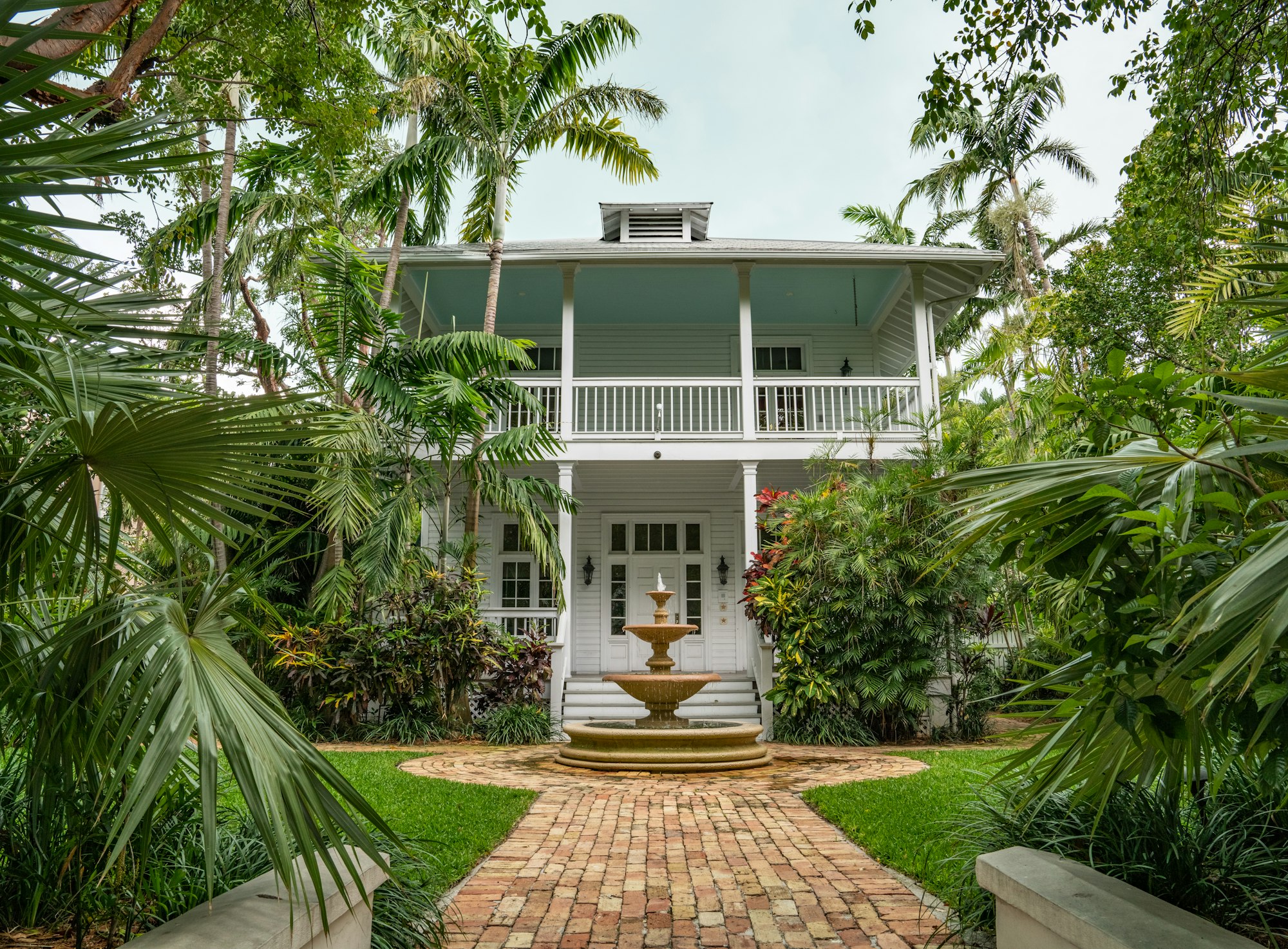
For instance, a single-story ranch-style home may cost less to renovate than a multi-story Victorian due to the latter's detailed architectural elements and potentially increased square footage.
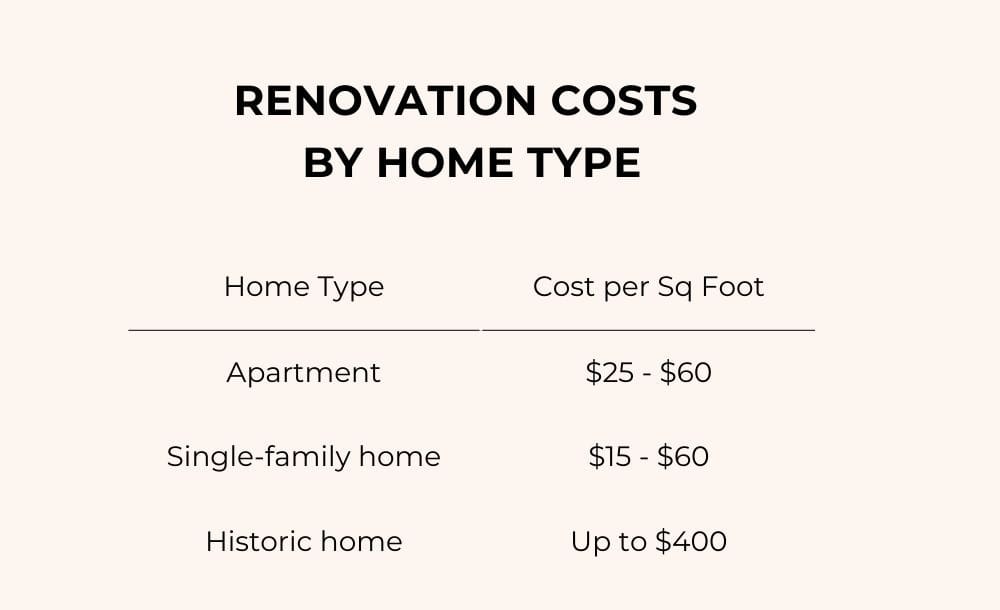
Each property type comes with unique challenges and expenses, from single-family houses to condos and townhouses. To give you a better understanding, refer to the table below:
Renovation costs based on location
Where you live can heavily influence material and labor costs. Urban areas often have higher labor and material costs compared to rural areas. Additionally, factors like local regulations and accessibility can impact overall expenses. Conversely, suburban and rural areas may offer more cost-effective options.
- Urban Areas: $50,000 - $75,000
- Suburban Areas: $40,000 - $60,000
- Rural Areas: $35,000 - $55,000
These estimates can vary depending on the project, materials chosen, and contractor rates. Rural areas might have limited access to contractors and specialized materials, potentially increasing costs in some cases.
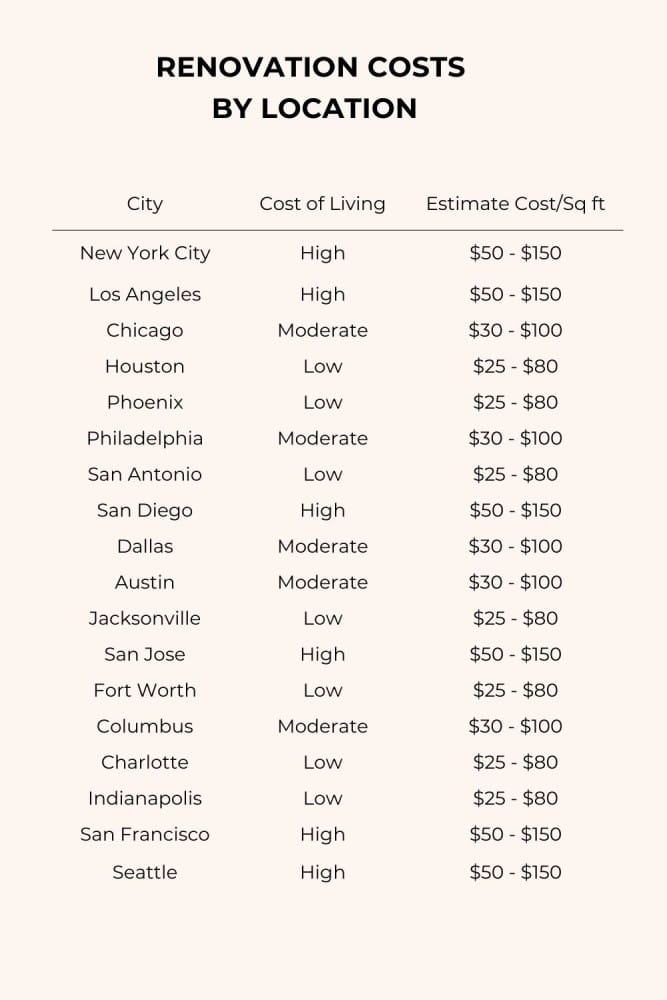
Renovation costs based on home size
The main factor in estimating the cost of your renovation will be the size of your home. More square footage equates to more materials and time needed for renovation, directly raising your budget ceiling. Larger homes require more materials and labor, resulting in higher expenses.
- Small homes (under 1,000 sq.ft.): $20,000 - $50,000
- Medium homes (1,000 - 2,000 sq.ft.): $30,000 - $100,000
- Large homes (over 2,000 sq.ft.): $50,000 - $200,000+
Cost of permits
Home renovation permits are necessary for most upgrades and often come with a fee. The complexity and number of permits required can add up, so it's essential to factor these costs into your renovation budget. Permit costs vary depending on the scope of work and your location but typically range from $50 to $5,000.
Changes to floor plans
Making changes to your home's floor plan can significantly impact renovation costs. Whether you're knocking down walls or adding new ones, expect to allocate additional funds for structural modifications. On average, floor plan changes can cost between $2,000 and $15,000.
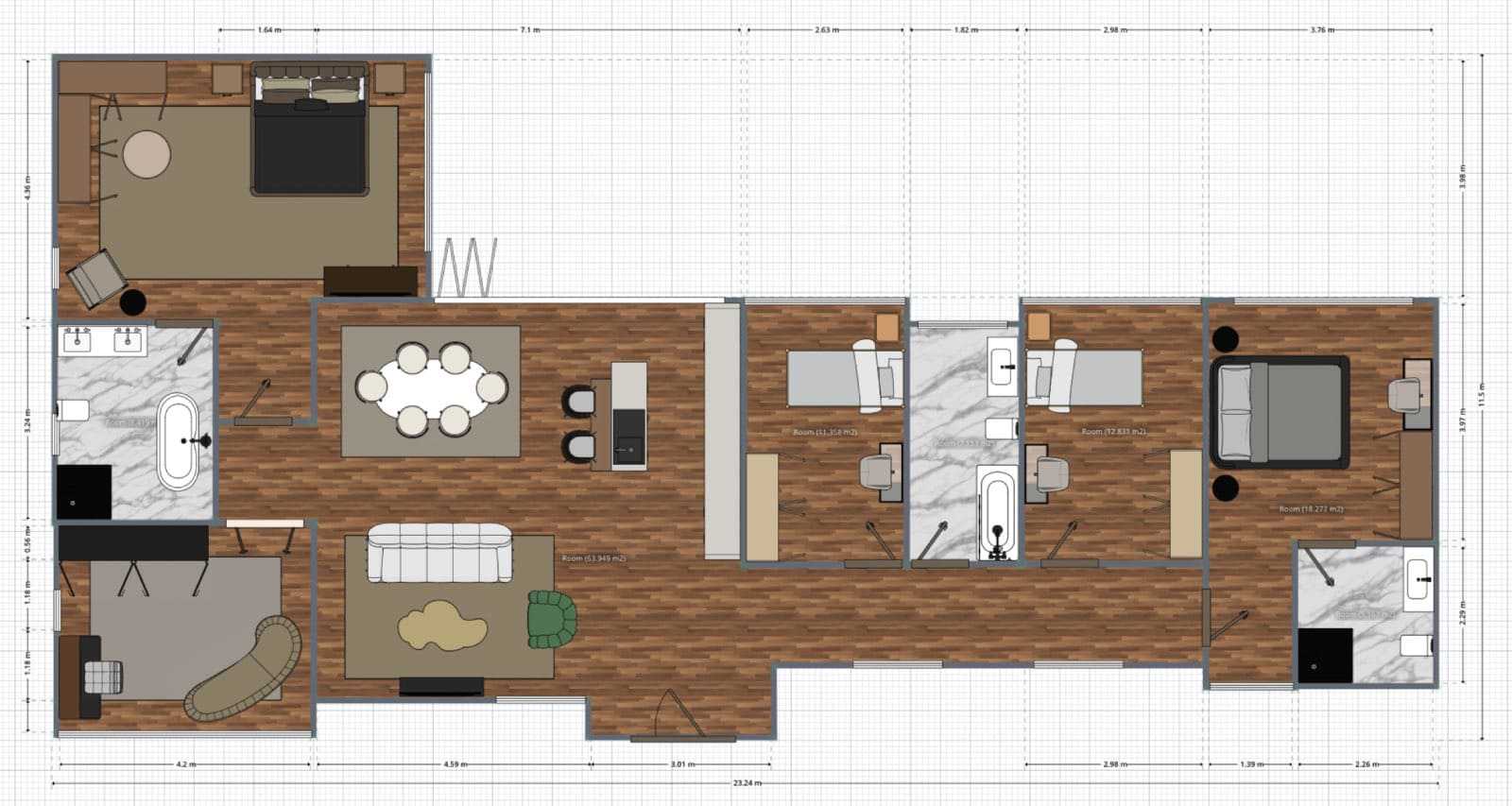
Plumbing
Updating plumbing fixtures or rerouting pipes can add to your renovation expenses. Depending on the complexity of the plumbing work, costs can range from $2,000 to $10,000+.
Electrical
Like plumbing, electrical work is essential and costly to modernize or change. Additional outlets, lighting fixtures, or major rewiring jobs can quickly inflate your bill. Expect to budget between $2,000 and $10,000+ for electrical work, depending on the extent of the renovations.
Want to design your dream home faster?
Let AI do the heavy lifting with Planner 5D.
HVAC
Heating, ventilation, and air conditioning are critical to home comfort. Installing or upgrading HVAC systems is another significant expense in home renovations. Costs vary based on the type of system and home size, with average expenses ranging from $3,000 to $15,000+.
Updating appliances
New appliances, including refrigerators, ovens, and dishwashers, can enhance your home's functionality and aesthetics. However, upgrading to high-end appliances can skyrocket your costs. Depending on the number and type of appliances, allocate approximately $2,000 to $20,000+ for appliance updates.
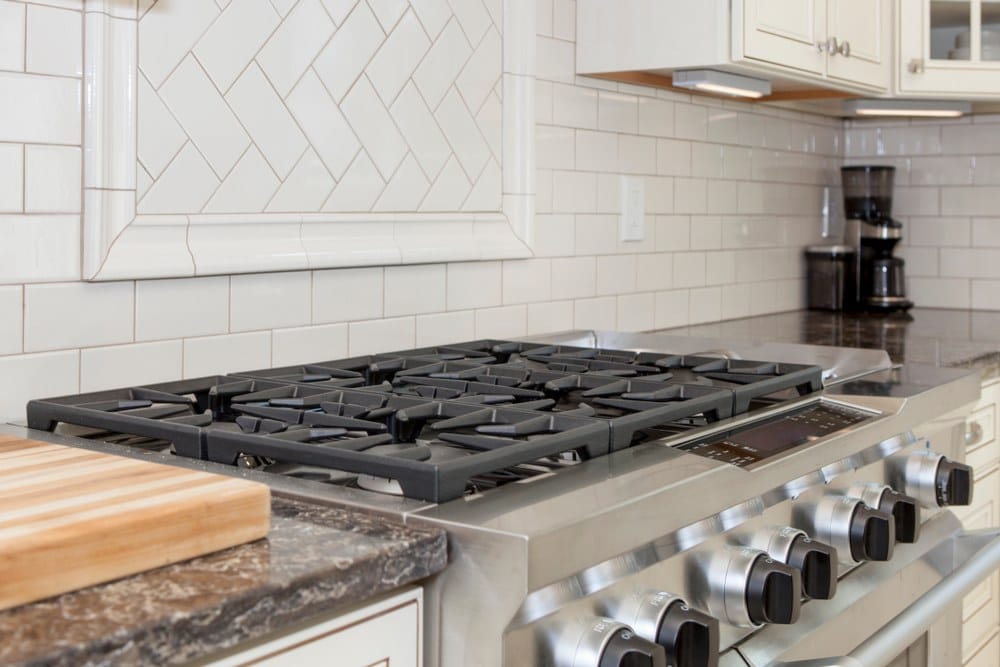
Costs for dealing with mold or asbestos
Discovering mold or asbestos during renovations can pose health risks and add unexpected costs to your project. Safe elimination or containment requires professional expertise and can lead to costly delays. Remediation expenses typically range from $2,000 to $20,000+, depending on the extent of the problem.
Foundation repairs
Any issues with your home's foundation must be addressed before renovations can proceed. Foundation repair is a significant project that ranges from underpinning to replacing a part of the slab, depending on the issue and structure. Foundation repair costs vary based on the severity of the damage but can range from $2,000 to $75,000.
Labor
Labor costs typically account for a significant portion of renovation expenses. Hiring reputable contractors and workers ensures a quality job, but it often comes with a premium price tag. Depending on the project's complexity and local labor rates, expect to spend between 40% and 60% of your total budget on labor.
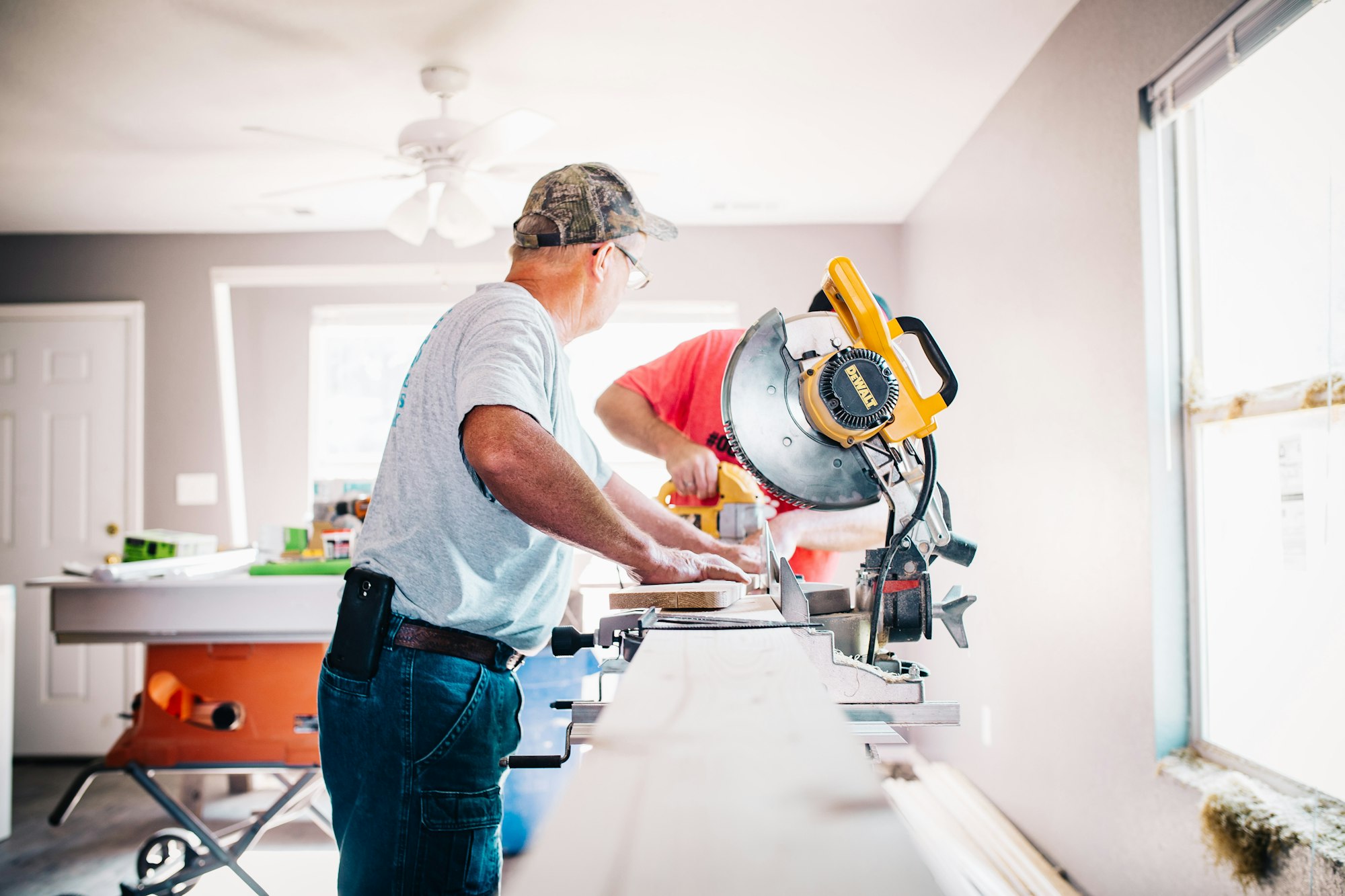
Home renovation costs by room type
Every room in your home serves a specific function and has a different set of challenges, which can significantly influence the overall cost of a renovation project. Understanding each area's unique needs and challenges is essential in budgeting and planning for effective home improvements.
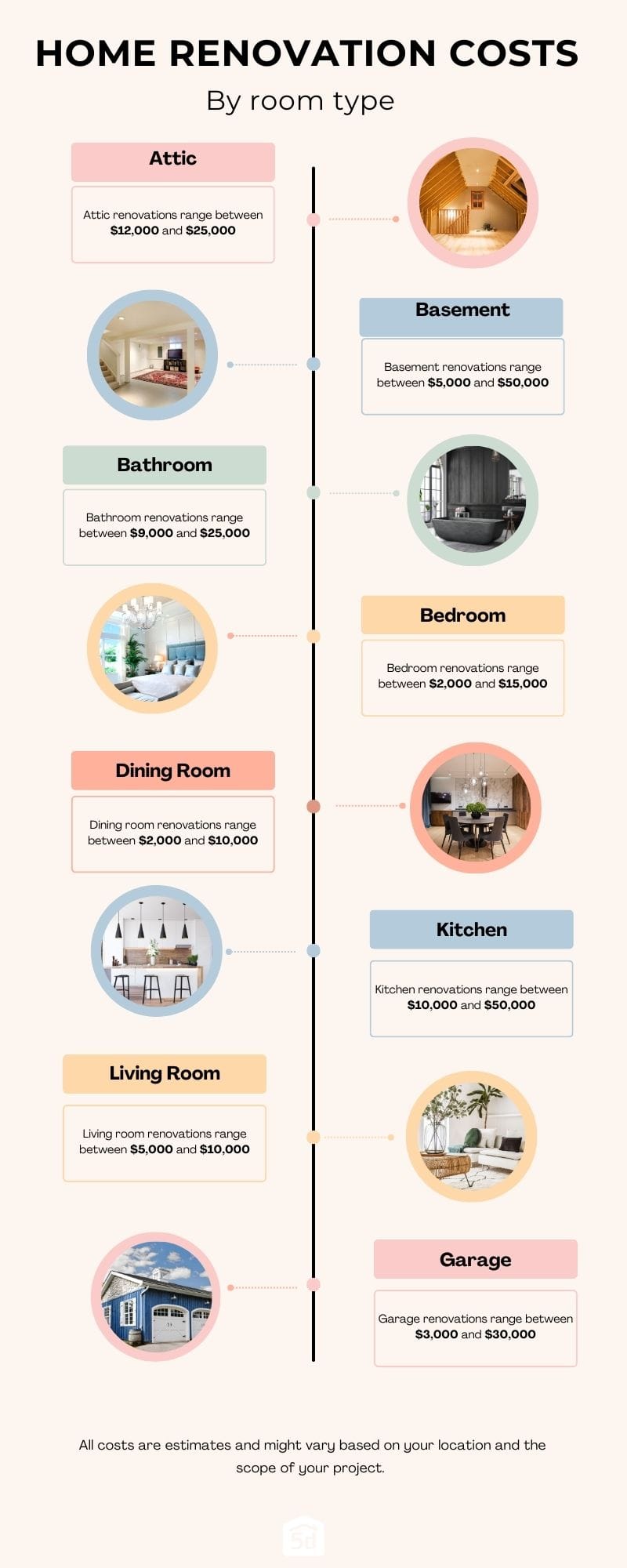
Bedroom
Bedroom renovations often involve cosmetic upgrades such as fresh paint, new flooring, or updated lighting. Compared to other rooms, the average cost is mid-range unless you plan on getting new furniture, which will add to the reno's cost.
Kitchen
The kitchen is one of the most expensive rooms to renovate. Costs vary significantly based on design, appliances, flooring, and countertop materials. A kitchen renovation can cost anywhere between $10,000 and more than $50,000.
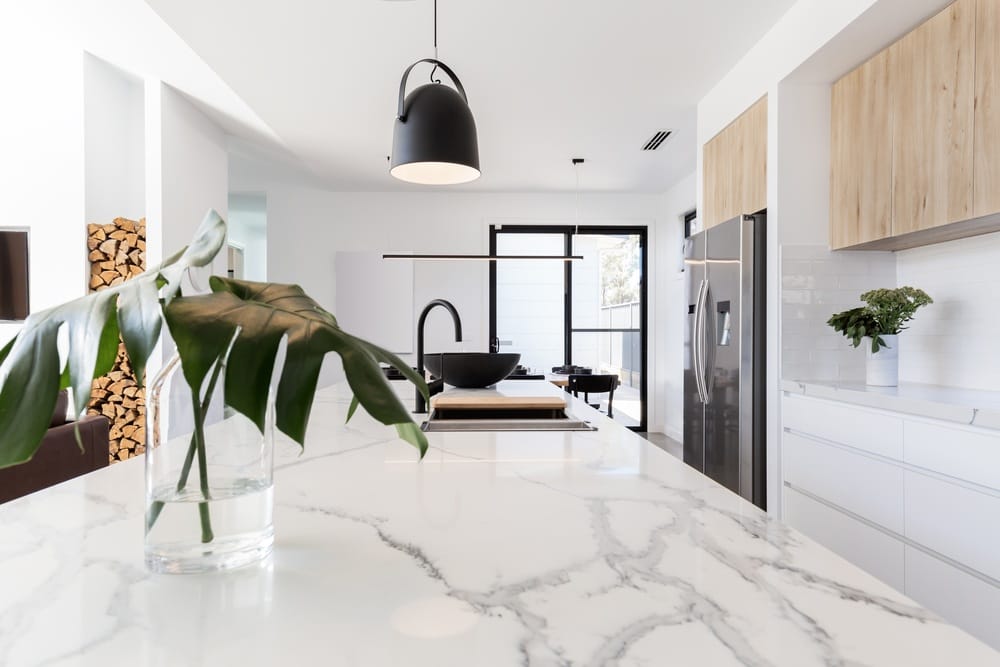
Living room renovation
The living room is typically a medium-cost renovation. It often includes new paint, updated flooring, and sometimes minor structural changes to improve the home's flow. The cost can vary anywhere between $2,000 and $15,000.
Bathroom renovation
Bathroom renovations are consistently expensive due to their small but complex design. Projects such as bathroom floor tiling, electrical, and plumbing might require a skilled contractor, adding to the total cost. If you consider expanding or reconfiguring the space, the project might set you back between $5,000 and $25,000+.
Basement renovation
Turning a basement into a usable living space involves costs related to waterproofing, insulation, and potentially digging or reinforcing walls for higher ceilings. Projects that require cosmetic changes will be more cost-effective. Depending on the scope of the renovation, you're looking at anywhere between $7,000 and $30,000.
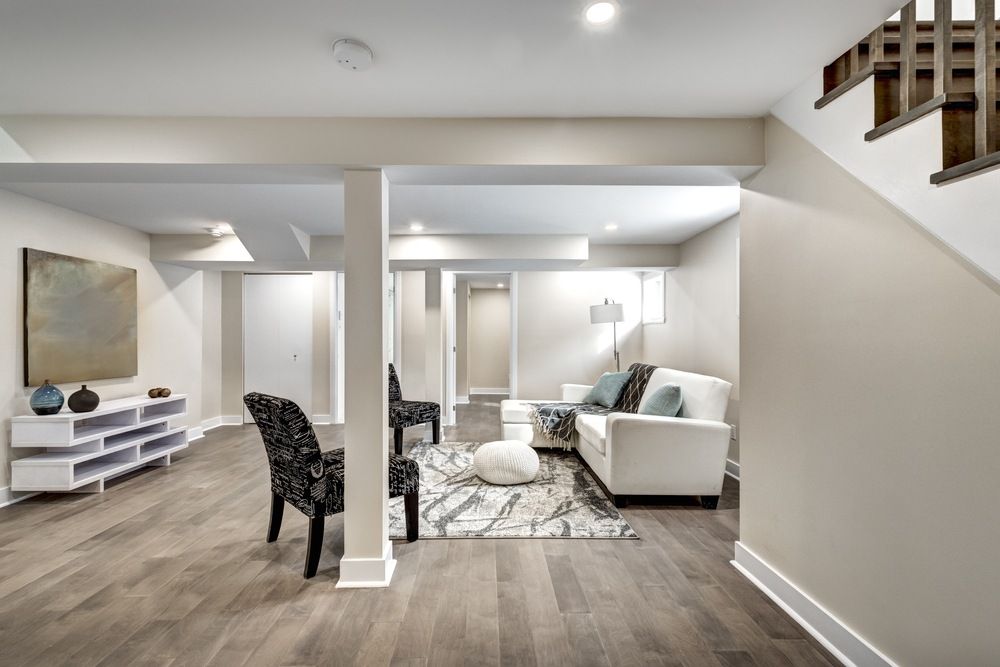
Attic
Converting an attic might involve similar costs to a basement renovation but with additional concerns about access, natural light, attic insulation, and the infrastructure needed for a living space. This type of project ranges between $10,000 and $35,000.
Garage renovation
Garage renovations can vary widely in cost. Converting it to a living space will require insulation, wall covering, and floor treatments. However, leaving it as a garage and updating it is typically less expensive. Depending on the scope of the project, you should budget between $3,000 and $30,000 for a garage renovation.
Home renovation costs based on project type
Home renovations are not limited to the inside of the home. Outdoor projects are more likely to require a special contractor, which means more money. Here are some of the exterior and interior renovation projects with higher costs to consider.
Roofing
Your roof is your home's first line of defense against the elements, making it essential to keep it in top condition. Roofing, including metal roofing projects, can range from minor repairs to complete replacements, with costs varying based on material quality and roof size. On average, you can expect to budget anywhere from $5,000 to $15,000 for a new roof installation.
Exterior siding
Updating your home's exterior siding can enhance curb appeal while improving energy efficiency and durability. The cost of siding installation depends on the material chosen, with options including vinyl siding, wood, fiber cement, and metal. Depending on the size and materials, you're looking to spend between $5,000 and $20,000 for a complete siding replacement.
Stuck on your next design move?
Let AI generate stunning layouts in seconds.
Windows
Replacing old or inefficient windows can enhance your home's aesthetics and energy efficiency. Window replacement costs vary depending on the number of windows, frame material, and installation method.
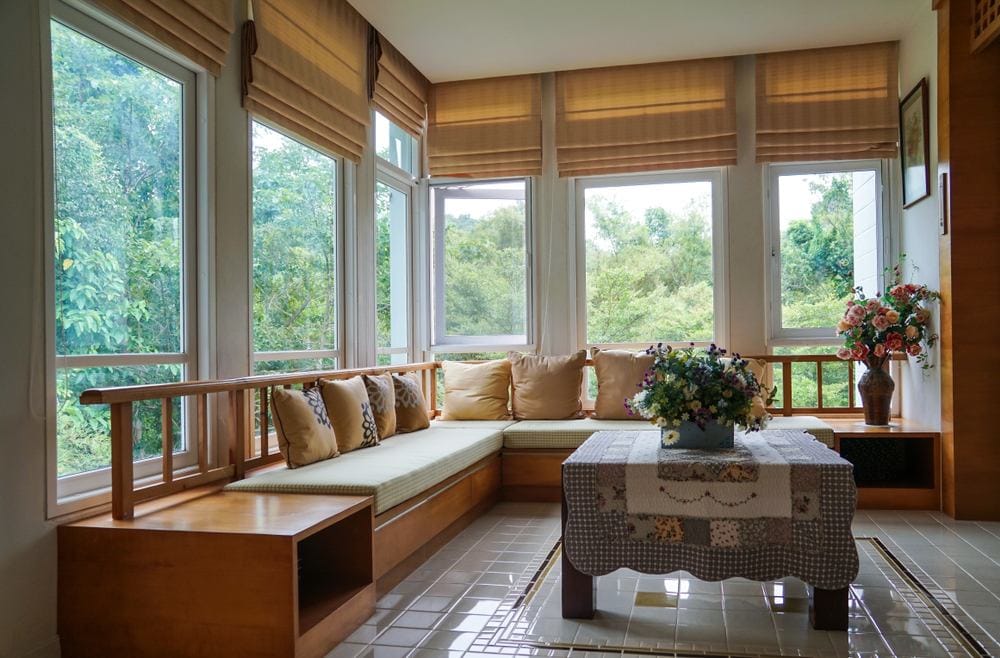
On average, you can expect to invest between $3,000 and $10,000 for a complete window replacement, with high-quality, energy-efficient windows typically commanding higher prices.
Patios or decks
Expanding your outdoor living space with a new patio or deck can provide a welcoming retreat for relaxation and entertainment. The cost of patio or deck installation depends on material choice, size, and site preparation requirements.
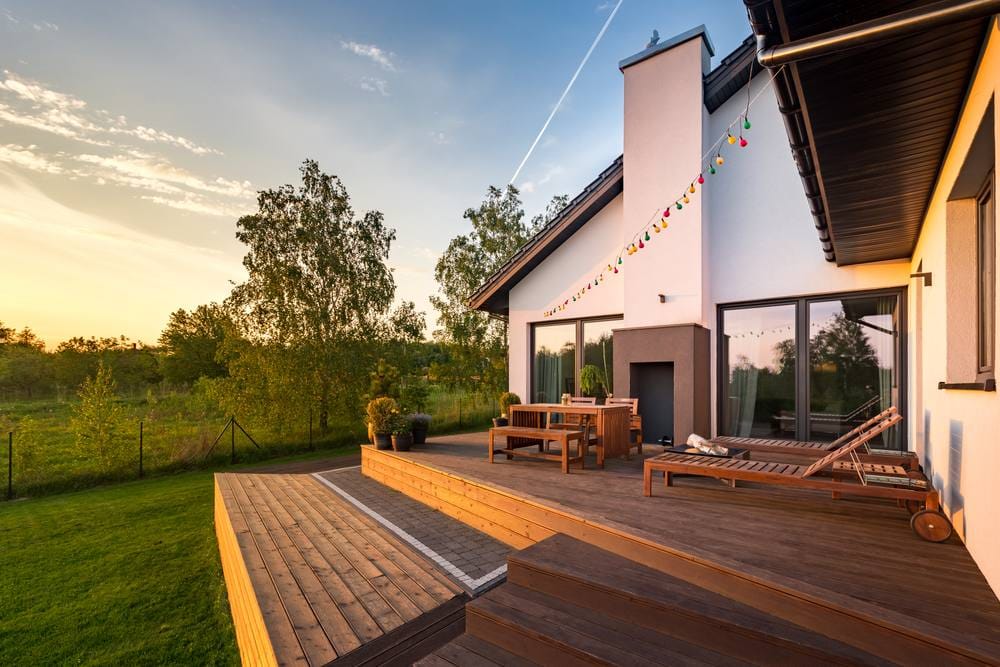
Basic patio installations may start at around $3,000, while custom-designed decks can range from $5,000 to $20,000 or more.
Central air conditioning
Installing central air conditioning can enhance comfort levels in your home, particularly during the hot summer months. The cost of AC installation varies based on factors such as system size, efficiency rating, and ductwork requirements.
You can expect to budget between $3,000 and $7,000 for a central air conditioning system, with additional costs for ductwork installation if needed.
Furnace or heat pump
Ensuring efficient heating is essential for maintaining comfort and energy savings in your home. Furnace or heat pump installations can vary in cost depending on the system type, size, and energy efficiency rating. On average, you can spend between $3,000 and $7,000 for a new furnace or heat pump installation.
Home addition
Adding extra square footage to your home can provide much-needed space for growing families or accommodating lifestyle changes. The cost of a home addition project depends on its size, function and finishings. Basic room additions may start at around $20,000, while larger-scale projects can exceed $100,000 or more, depending on the level of customization and finishes.
Gut renovation
A gut renovation involves stripping a space down to its bare bones and rebuilding it from scratch. It often involves extensive structural changes and updates to plumbing, electrical, and HVAC systems.
The cost of a gut renovation varies significantly depending on the size and condition of the space and the desired level of finishes and amenities. You should budget accordingly, with costs typically ranging from $50,000 to $200,000 or more for a comprehensive gut renovation project.
Tips for budgeting for a home renovation
Before you begin any home renovation project, identify the projects you want to tackle and determine how much you're willing to spend on them. Research the average costs of similar renovation projects in your area and get quotes to better understand what to expect.
Design smarter, not harder.
AI suggestions tailored to your space and style.
Websites, forums, and home improvement stores can be valuable resources for gathering pricing information and help you set a renovation budget.
Prioritize projects
Determine which projects are essential and which ones can be deferred or scaled back if necessary. Focus on addressing critical issues first, such as structural repairs or safety concerns, before tackling cosmetic upgrades.

Hiring a professional vs DIY
Hiring a professional contractor ensures everything is done according to building codes and with skilled labor. However, it comes at a cost that includes contractor fees and markups on materials.

Doing the work yourself can potentially save money, but it requires significant time, effort, and renovation skills. Also, consider the complexity of your project and your own skills before deciding whether to hire a professional or do it yourself.
Cost to renovate a home yourself
Factor in the cost of renting equipment and potentially having to hire professionals for complex tasks like electrical or plumbing work if you're not comfortable tackling them yourself. Remember that tackling projects without existing know-how can be more costly in the end, as you might have to hire a professional to fix your mistakes.
Get multiple quotes
Don't settle for the first quote you receive. Instead, shop around and obtain multiple quotes from reputable contractors to ensure you get the best value. Compare prices, services offered, and customer reviews before making a decision.
Negotiate pricing
Don't be afraid to negotiate pricing with contractors or suppliers. Many vendors are willing to offer discounts or incentives, especially for larger projects or repeat business. Be assertive yet respectful in your negotiations to secure the best deal possible.
Select budget-friendly materials
Opt for cost-effective materials and finishes that align with your budget without compromising quality. Explore alternative options or consider refurbished or gently used materials to save on costs without sacrificing style.
Plan for contingencies
Expect the unexpected and be prepared to handle unforeseen expenses that may arise during the renovation process. Having a contingency fund in place can provide peace of mind and help you navigate any challenges that come your way. Consider setting aside at least 10-20% to cover any unexpected expenses.
Plan ahead
Create a detailed renovation plan outlining the scope of work, materials needed, and timeline for completion. Planning ahead can minimize disruptions and prevent costly delays or changes mid-project.
Conclusion
The decision to renovate your home is not simple. Many factors go into this decision process, which, if done right, can offer many benefits. Whether you want to increase your home's resale value or simply update your living space and make it more comfortable, doing your research will go a long way.
By understanding the factors influencing renovation costs and implementing cost-saving strategies, you can achieve the home of your dreams without breaking the bank. Whether tackling a small-scale makeover or a full-blown renovation, staying informed and flexible throughout the process is critical.
Planner 5D: The Future of Interior Design
Experience the power of AI-driven design with Planner 5D. Our innovative tools, including the Design Generator, Smart Wizard, and AI floor plan recognition, make bringing your dream home to life easier than ever. Transform your vision into reality and unlock a world of design possibilities today.
Start designing your dream homeFAQ
How much does a home renovation cost?
To find out how much home renovation costs, you have to factor in where you live, the type of home you own and what projects you are planning. The median cost for a standard-size home is anywhere between $20,000 for smaller projects and $100,000 or more.
How can I budget for a home renovation project?
Use a home renovation cost calculator to find out the average costs for similar renovations in your area and set a realistic budget based on your financial situation. To account for potential unforeseen expenses, add a 10-20% contingency fund to cover any unexpected costs. Additionally, consider obtaining multiple quotes from contractors to ensure you get the best value for your money.
What are some unexpected expenses in home renovations?
Structural issues such as water damage or foundation problems, hidden electrical or plumbing issues behind walls, and the discovery of mold or asbestos can significantly increase your renovation costs.
Also, any changes to the original plan or layout can lead to additional expenses. Anticipating potential costs and budgeting accordingly can help with any financial surprises during the renovation process.
Should I renovate my home all at once or in stages?
Renovating all at once can be more disruptive to your daily life, but this approach may be more cost-effective, depending on your situation. It also means the contractors can complete the project more efficiently without returning multiple times. Renovating in stages allows you to spread out the costs over time and prioritize specific areas of your home.
What are the most expensive items to renovate?
Kitchens and bathrooms are typically the most expensive renovation projects. These rooms often require costly upgrades such as cabinetry, countertops, fixtures, and appliances. Structural changes or plumbing and electrical work can also drive up the overall expenses. Other costly renovations may include significant structural changes, such as additions or removing load-bearing walls, and upgrading HVAC systems or roofing.
Is it cheaper to renovate or buy a new house?
Renovating is usually a more cost-effective solution, especially if you love your current neighborhood or have a sentimental attachment to your home. Prices of homes vary based on location, and you also have to factor in the costs associated with buying and selling property. The decision should be based on your budget and requirements. Consult a real estate professional in your area to help you decide.
